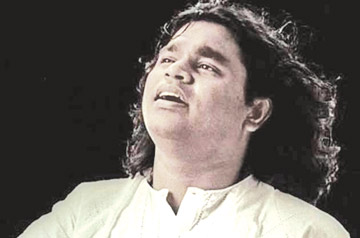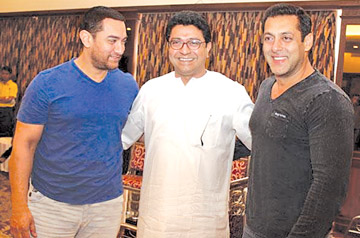India's latest bandwagon is the 'ban' wagon
by Stanley Mathews
Almost every group in India, whether social, political, ethnic or
religious, is itching to jump on to a new bandwagon, the 'ban' wagon to
use a term invented by The Times of India. For one reason or the other,
groups, through the length and breadth of India, want this or that
banned. It could be meat in one place, beef in another, a book here, or
a film or a painting there.
 |
|
Music maestro A.R.Rahman
Pic: Courtesy ibnlive.in |
Bans were imposed during British rule too, but it has touched
epidemic levels in independent India, especially now, with the spread of
political consciousness, growth of identity politics, increasing
political competitiveness and the exponential growth of the media, its
reach and influence. Seeking a ban on some issue has become a way to get
noticed, stir the communal and political pot, and fish in the troubled
waters.
In June, Vishwa Hindu Parishad leader Sadhvi Prachi demanded that
Muslims who oppose yoga should be sent to Pakistan after the All India
Muslim Personal Law Board opposed the Narendra Modi government's
decision to observe one day in a year as 'Yoga Day'.
Ban on meat and beef
Yoga, the board said, has Hindu rituals like 'Surya Namaskar' or sun
worship which are un-Islamic. The Sadhvi also asked people to boycott
the films of the Khans of Bollywood, because they 'promote violence' in
their action thrillers.
This month, several Indian states ruled by Modi's Bharatiya Janata
Party (BJP) had banned the sale of meat during the Jain festival of 'Paryushan'
ostensibly to respect the sentiments of the vegetarian Jains. Seeing
this as BJP's way of winning over the Gujarati-speaking Jains to its
side, its rival in Maharashtra, the Maharashtra Nirman Samiti (MNS)
organized a meat-eating session in areas populated by Jains. It
maintained that Maharashtrians are meat eaters and cannot be forced to
abjure it. In Jammu and Kashmir, a Muslim-majority state, the Jammu
bench of the state High Court, comprising two Hindu judges, ordered the
police to strictly impose the ban on cow slaughter and beef eating under
the Ranbir Penal Code enacted in 1932, in pre-independence days by the
Hindu Maharajah of Kashmir. As this caused tension in the Kashmir
Valley, dominated by the Muslims, a Muslim filed a petition in the
Srinagar bench of the High Court seeking the annulment of the Ranbir
Penal Code on the grounds that the ban on cow slaughter and consumption
of beef is an attack on Islam. The court, comprising a Hindu and a
Muslim judge, sent notice to the government to submit its response, and
also said that the state legislature could draft a new code to replace
the Ranbir Code. At one stage the controversy threatened the existence
of the BJP-Peoples' Democratic Party (PDP) coalition government in Jammu
and Kashmir.
 |
|
Maharashtra Nirman Samiti
Chief, Raj Thackeray with the Khans, Aamir and Salman
Pic: NDTV |
Meanwhile, in Chennai, music maestro A.R.Rahman learnt that the Mufti
of Mumbai had issued a 'fatwa' (ban) on his composing music for the
Iranian film 'Muhammad: Messenger of God' directed by the renowned Majid
Majidi. The Mufti said that no film on the Prophet could be made, leave
alone composing music for it. When there was a danger that Muslim
radicals will hold demonstrations all over India against the film and
against Rahman personally, the music composer replied to the 'fatwa' in
his Facebook page.
He said that the intention of the film is to unite humanity, clear
misconceptions, and spread the message that life is kindness, about
uplifting the poor and living in the service of humanity and not
mercilessly killing innocents in the name of the Prophet. "My spiritual
experiences of working in the film are very personal and I would prefer
not to share these," Rahman added in a mild act of defiance.
It is doubtful if the Indian state would have come to Rahman's rescue
if he was hounded by Jihadists, but the Islamic Republic of Iran came to
his rescue which silenced the Mumbai Mufti. The Iranian Embassy in New
Delhi issued a statement saying: "The film of Majid Majidi is an
artistic work and any opinion about it should be expressed only after
seeing it. Launching hot discussions before seeing the film may be
wrong, illogical and incorrect. No insult has been committed to Islamic
values in the film." It is pointed out that the film does not show the
face of the child actor who plays the Prophet in the film.
Earlier too, there had been a demand from Muslims to ban the
Rahman-Mani Ratnam film 'Bombay' on the Bombay riots simply because a
Muslim girl falls in love with a Hindu boy in the script! World-renowned
painter M.F.Hussein had to flee India and settle down in Dubai after he
painted a picture of Goddess Saraswathi in the nude. He died in exile.
The making of a British documentary 'India's Daughter' on the
infamous rape of a girl in a public bus in Delhi, was banned in India
because it might show India as a dangerous place for women. Last year,
the Gounder caste in Tamil Nadu forced the Tamil Nadu government to ban
Perumal Murugan's historical novel, 'Madhorubagan' (Half Woman) because
it spoke about a past temple ritual in the Thiruchengode area in which,
during the festival night, a woman could have sex with any man of her
choice and the child born of this union, was deemed a Gift of God. The
Goundars considered this to be untrue and a calculated insult to their
community and forced the withdrawal of the book and physically
threatened the author. Murugan's plea that the material was based on
intensive historical research fell on deaf ears. So much so that even
the police asked him to flee for his own safety. Protests by fellow
writers were feeble, because they knew that the State's law and order
machinery would not back them. In desperation Perumal Murugan put out a
statement saying that he would not write anymore.
Bans have a hoary past
Banning of books has been on for a long time in India, tracings its
roots to the British era. But the pre-independence era saw only a few
books being banned compared to the vast number of proscriptions in
independent India.
Among the books banned during British rule are: Hindu Heaven by Max
Wylie (1934); The Face of Mother India by Katherine Mayo (1936); Old
Soldier Sahib by Private Frank Richard (1936); The Land of Lingam by
Arthur Miles (1937); and Scented Garden: Anthropology of Sex Life in the
Levant by Bernard Stein (1945). These books are still proscribed!
Among the books banned after independence are: Salman Rushdie's
Satanic Verses; Taslima Nasreen's Lajja; Polyester Empire by Hamish
McDonald (on the Ambanis, a powerful industrial group); Jinnah: India,
Partition and Independence by Jaswant Singh (for praising Pakistan's
founder M.A.Jinnah and portraying Gandhi and Nehru as weaklings); Who
Killed Gandhi by Lourenco de Sadvendor; The Price of Power by Seymour
Hersh, in which former Indian Prime Minister Morarji Desai was described
as a 'star performer of the CIA'; The Area of Darkness by V.S.Naipaul
for showing India in poor light; The Heart of India by Alexander
Campbell for lampooning Indian bureaucrats; Nine Hours to Rama by
Stanley Wolpert for saying Gandhi was killed because of a security
lapse; The Ramayana by Aubrey Menon; Shivaji: The Hindu King in Islamic
India by James Laine for going too deep into Shivaj's family; Smash and
Grab: The Annexation of Sikkim by Sunanda K.Dutta-Ray; Nehru: Political
Biography by Michael Edwards; The Hindus: An Alternative History by
Wendy Doniger.
Explaining the spate of bans, sociologist Shiv Viswanathan said that
politics in India is based on identities, religious, caste and ethnic
identities. Political parties mobilize people for elections on the basis
of castes and communities. Communal strife helps them demarcate
communities and cultivate them intensely. Pandering to communal
sentiments is a tried and tested political tool. The growth of democracy
has also contributed by bringing out identities which were previously
not there or were dormant due to the absence of self consciousness.
Explaining the ban on foods, sociologist Dipankar Gupta says that
food has always been a divider and a marker of caste, social and
religious differences in India. Therefore, when exploiting these
differences, food becomes an issue automatically.
Then there is the law, which is discriminatory despite the
Constitutional guarantee of freedom of thought and expression. Wendy
Doniger said the following about Penguin India which withdrew her much
acclaimed book on Hindus: "They were finally defeated by the true
villain of this piece - the Indian law that makes it a criminal rather
than a civil offence to publish a book that offends any Hindu, a law
that jeopardizes the physical safety of any publisher, no matter how
ludicrous the accusation brought against a book." |

